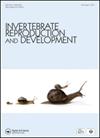Laboratory-simulated marine heatwave accelerates early embryonic development in the sea urchin Arbacia punctulata at its cold range edge
IF 0.8
4区 生物学
Q4 REPRODUCTIVE BIOLOGY
引用次数: 0
Abstract
ABSTRACT Marine heatwaves are discrete periods of anomalously warm sea temperatures that are globally increasing in frequency and intensity. Marine heatwaves that occur in spring and summer may coincide with the developmental timing of sensitive early life-history stages of benthic marine invertebrates. The successful development of these early life stages, along with other physical and biological factors, will determine the abundance of benthic populations. Here, we examine the effects of a laboratory-simulated marine heatwave on early development (fertilization and embryonic cleavage) in the sea urchin Arbacia punctulata taken from its cold (northern) range edge in the Northwest Atlantic. We predicted that a marine heatwave would yield accelerated development given that ambient temperatures at this cold range edge are likely suboptimal for development of A. punctulata. Consistent with this hypothesis, we observed faster fertilization and cleavage rates in a marine heatwave treatment (27.5°C) as compared to an ambient temperature treatment (21.8°C) within the first 3 hours of development. The results contribute to our understanding of how marine heatwaves can affect the earliest life stage of A. punctulata.实验室模拟的海洋热浪加速了海胆在其寒冷范围边缘的早期胚胎发育
摘要:海洋热浪是全球范围内频率和强度不断增加的异常温暖海洋温度的离散时期。春季和夏季发生的海洋热浪可能与海底无脊椎动物早期生命史敏感阶段的发育时间相吻合。这些早期生命阶段的成功发展,以及其他物理和生物因素,将决定底栖生物种群的丰度。在这里,我们研究了实验室模拟的海洋热浪对取自西北大西洋寒冷(北部)山脉边缘的斑海胆早期发育(受精和胚胎分裂)的影响。我们预测,海洋热浪将加速发展,因为这一冷区边缘的环境温度可能不适合点状a.punctulata的发展。与这一假设一致,我们观察到,在发育的前3小时内,与环境温度处理(21.8°C)相比,海洋热浪处理(27.5°C)的受精率和卵裂率更快。这一结果有助于我们理解海洋热浪如何影响点状A.punctulata的最早生命阶段。
本文章由计算机程序翻译,如有差异,请以英文原文为准。
求助全文
约1分钟内获得全文
求助全文
来源期刊
CiteScore
1.90
自引率
0.00%
发文量
21
审稿时长
>12 weeks
期刊介绍:
Invertebrate Reproduction & Development ( IRD) presents original research on the reproductive and developmental biology of the Invertebrata, both embryonic and postembryonic. IRD welcomes papers reporting significant results obtained using new techniques. Encouraged topic areas include: aquaculture, physiology, biochemistry, functional morphology, phylogeny, behavioural and regulatory mechanisms, including genetic, endocrine and molecular studies. Papers containing qualitative descriptions of reproductive cycles and gametogenesis will not be considered. IRD is published in association with the International Society of Invertebrate Reproduction and Development.

 求助内容:
求助内容: 应助结果提醒方式:
应助结果提醒方式:


